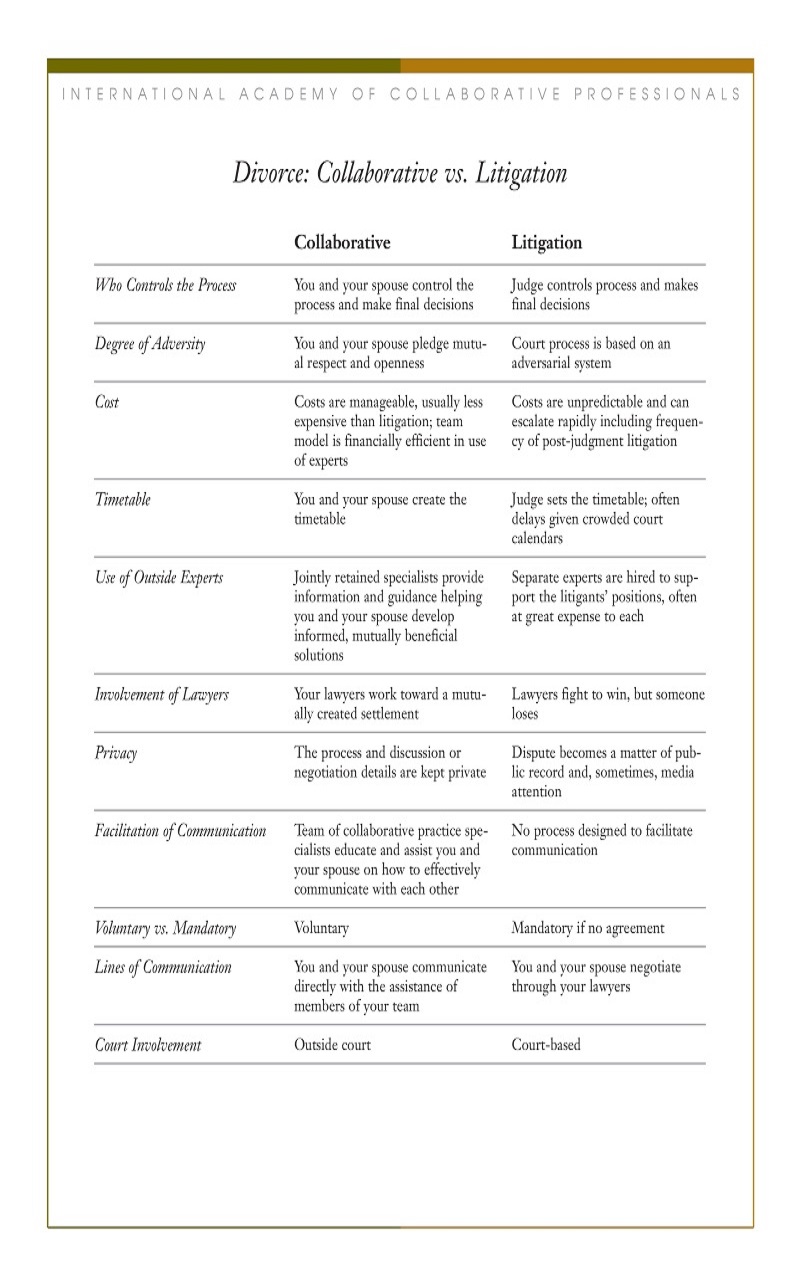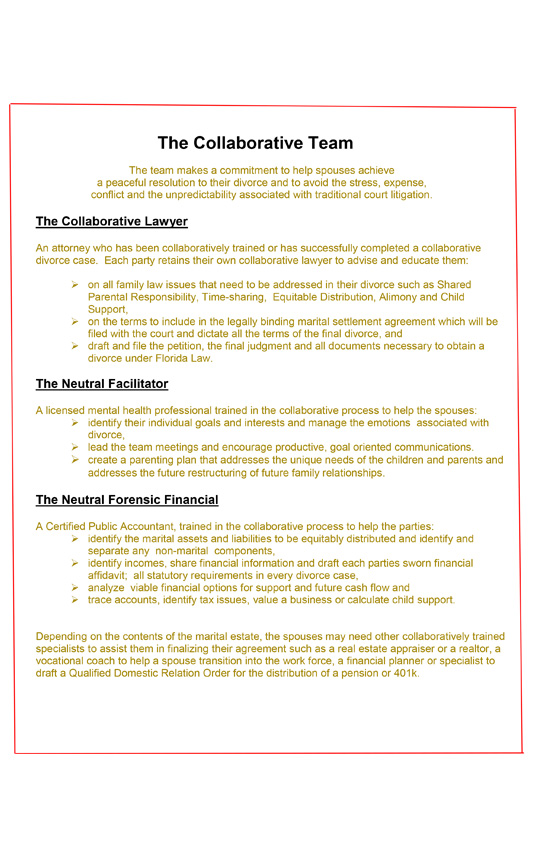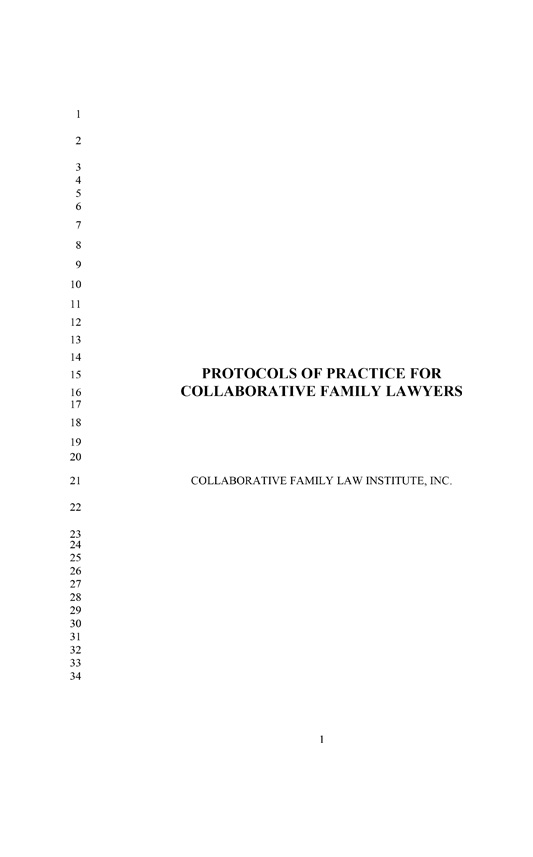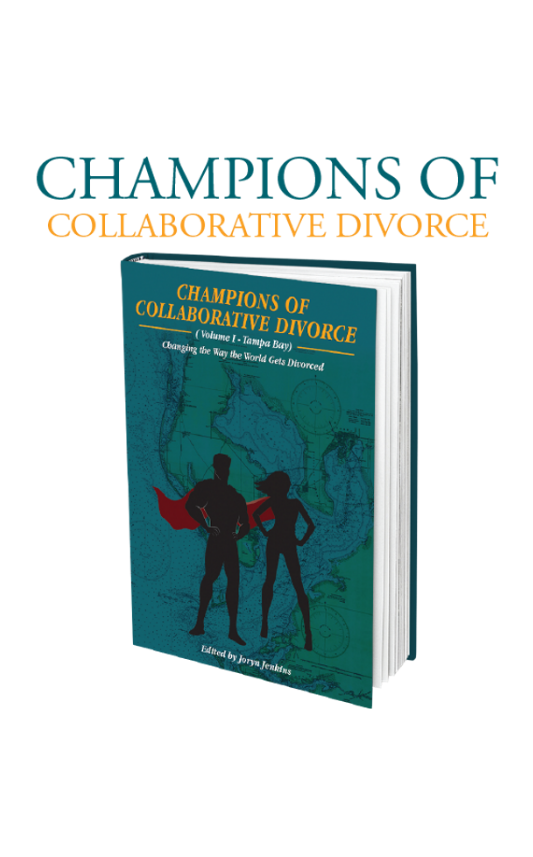Collaborative Practice
Is Collaborative for You?
Q: Why should I consider the Collaborative Process for my divorce?
A: You may not be able to save your marriage, but you can protect your future and that of your children. The method couples choose for pursuing their divorce will have a powerful impact on the happiness of their post-marriage relationships, especially their ongoing relationships with their children and future spouses. The worst outcomes arise from choosing the adversarial approach and ending up suffering through a bitterly litigated divorce. Bad divorces leave a toxic residue that can last a lifetime. Often, children suffer emotional damage that takes years to overcome, if ever. By choosing a non-adversarial approach provided by Collaborative practice professionals, you have the opportunity for a settlement that meets your specific needs.
Q: Do my spouse and I each have our own Collaborative family law attorney?
A: Yes. Each person retains his or her own Collaborative family law attorney to advise and assist in negotiating an agreement on all your issues. Your attorney keeps you informed throughout the process of your rights and gives your sound legal advice about your situation. Collaborative divorce attorneys make every effort not to aggravate the tensions that already exist between you and your spouse. Their role is to create a safe environment for you to assess your options and work to negotiate a fair resolution everyone can live with.
Q: My spouse and I are very angry with each other right now. Is Collaborative practice only for people who are getting along, or “amicable divorces”?
A: Not at all. Anger is a natural response, even if we are unhappy in the relationship. In a Collaborative divorce, you will receive support and guidance from team professionals such as divorce coaches who can help you and your spouse process all the strong feelings including grief and anger that are a natural result of divorce. In a conventional litigated “no fault” divorce, people are left with no way to deal with anger or grief. Unresolved feelings end up fueling fights over other issues such as child custody, support or property division. In Collaborative practice, we help you learn to express emotions in a direct, respectful way.
Q: What is the benefit of Collaborative Divorce?
A: Did you ever meet or know someone whose divorce took place many years ago, but their emotions are so raw that they speak of it as if it took place last month? In divorce it is so easy to slip into battle mode in which each side wants to win and the other to lose. Unfortunately, emotional energy and economic resources can be depleted with this kind of strategy. For many people going through a divorce it is natural to react defensively, especially if one feels vulnerable or attacked. In traditional adversarial divorce, these emotions can fuel expensive litigation, and people have often found that they need years to recover, not just from the ending of an important relationship, but from the divorce process itself. Divorce does not have to involve intense hostility and stress. The Collaborative Divorce Process helps each spouse develop settlement options. The Collaborative professionals help each client develop skills to manage his or her emotions, and encourage them to create the necessary environment to resolve conflict collaboratively. This is no longer about winners and losers in the divorce wars; rather, it is a paradigm shift in which the professionals work together to help clients speak and listen to each other with respect, and reach agreements that leave everyone as whole as possible.
Q: Will the Collaborative Process protect my privacy?
A: People are generally unaware that the courtroom is public and open to the community or the press; anyone can sit in the courtroom during these proceedings. Likewise your friends, colleagues, neighbors, and the curious can review the court file and read the pleadings and motions which may contain accusations made by you and by your spouse, regardless of the truth of these allegations. Public dissemination of the personal details of your family and your financial life can be embarrassing, professionally damaging, and hurtful to your children. In a Collaborative Divorce your privacy is protected. Only you, your spouse and your Collaborative team know the details of your divorce. The Collaborative Process not only reduces the conflict, it prevents the derogatory accusations from becoming the main theme which impedes a settlement and constructive problem solving.
Q: Why do I need a Collaborative Financial Professional?
A: To protect financial assets. Making good financial decisions during divorce is critical to the outcome of a fair and equitable settlement. These decisions can be particularly overwhelming. With the guidance of a neutral Collaborative Financial Professional, you can have peace of mind as you navigate through the potential minefield of financial decisions in your divorce.
Overview of Financial Issues in Divorce:
- Income/cash flow available for spousal support and child support
- Valuation of businesses
- Income tax issues including residence sales and capital gains
- The tax consequences of equitable distribution
- Budgets, planning, and adequacy of resources
- Retirement divisions and projections
- Computation of child support
- Alimony recapture computation
- Determination of marital and non-marital components of assets and liabilities
- Understanding of complex financial documents and products
- Preparation of the Florida Family Law Financial Affidavit
- Determination and projection of future retirement needs
- Ensuring that your children’s financial needs are met and addressed
- Plan for the insurance needs of the family
Q: Can the Collaborative Divorce Process help to protect my children?
A: Collaborative Divorce is for parents who want to protect their children from the emotional damage of divorce. The stress, conflict and uncertainty can be major risk factors for childhood development. As much as parents say they want what is best for their children, they often have difficulty working together for the sake of their children. Children become the innocent victims. Collaborative Divorce offers parents an opportunity to create their post-divorce parenting relationship right from the start with the help of a Collaborative team. They are encouraged to understand each other’s underlying interests. The Collaborative Facilitator helps parents think through every aspect of their divorce that affects their children. They create their parenting plan that delineates their post-divorce timesharing and decision-making. They envision ways to create an emotionally safe life for their children in both homes and preserve childhood memories. Parents learn how to recognize and how to respond to negative behaviors and signs of anxiety. They also prepare for navigating new territory, such as integrating new relationships into their children’s lives. In these and other ways, Collaborative Divorce responds to the needs of children.
Families with Special Needs Children
Divorcing parents with a special needs child face unique challenges including financial and co-parenting factors. Collaborative Practice puts the needs of your child first. A team of interdisciplinary professionals, including legal, mental health and financial professionals, work together to help you navigate the issues that may be present in a special needs divorce. These include:
- Tailored “Intake and Assessment” process to assist the Collaborative team to understand your unique circumstances and coordinate their efforts to best address your issues.
- Specialized financial analysis to help quantify the current needs, sources of funding/programs and projected future costs of care for your child.
- Co-parenting issues and helping you make arrangements that take into account your special needs child and the needs of any typically developing siblings.
10 Tips for Talking to Children About Divorce
- Agree on a divorce narrative that gives your children an explanation that makes sense to them.
- Present the narrative to your children together.
- Tailor your language to your child’s developmental level.
- Preserve your children’s relationships with both parents – no good guys and bad guys.
- Emphasize your love for your children, permanence in their lives and your commitment to parent together.
- Emphasize that divorce has to do with grown-up problems and that children are not to blame.
- Be concrete with your children about what aspects of their lives will stay the same and what will change.
- Use the opportunity to teach your children life lessons about change and resilience.
- Be vigilant about protecting your children from witnessing conflict and intense emotionality.
- Recognize that parenting is forever.
Collaborative Law
Welcome to The Law Offices of Julia Best Chase, where we specialize in Collaborative Law – a unique approach to resolving legal disputes. At our firm, we believe in the power of negotiation and mutual respect to create positive outcomes. Collaborative Law offers a non-adversarial alternative to traditional litigation, focusing on open communication, transparency, and cooperation. Our dedicated team of legal professionals is committed to guiding you through a more amicable and efficient resolution process, ensuring your interests and those of all parties are fairly represented. Choose The Law Offices of Julia Best Chase for a path to resolution that fosters understanding and lasting agreements.
What is Collaborative Law?
Collaborative Law in Florida is a legal process designed for resolving disputes, especially in the context of family law, such as divorce, child custody, and property division. It emphasizes cooperation, transparency, and negotiation over traditional adversarial courtroom tactics. Here’s an overview of how it works in Florida:
Voluntary Process
Collaborative Law is a voluntary process where both parties agree to resolve their disputes outside of court. It’s based on the shared belief that it’s in the best interests of both parties to work collaboratively rather than engage in a confrontational legal battle.
Signed Participation Agreement
Both parties, along with their respective lawyers, sign a “participation agreement.” This agreement commits them to the process, stipulates that neither lawyer can represent the parties in any future litigation related to the dispute, and emphasizes honesty, respect, and transparency.
Team Approach
Collaborative Law often involves a team approach. Alongside attorneys, the process can include other professionals like financial advisors, child specialists, or mental health counselors who help address all aspects of the dispute.
Meetings and Negotiations
Instead of court appearances, the process involves a series of four-way meetings between the parties and their lawyers. These meetings are designed to identify the needs and interests of both parties, explore various options, and negotiate a mutually acceptable settlement.
Confidentiality
The process is confidential, encouraging open communication and honesty. Anything said during the collaborative process cannot be used later in court if the process breaks down and litigation ensues.
Focus on Solutions, Not Blame
Collaborative Law shifts the focus from blaming each other to finding practical and fair solutions. It’s particularly beneficial in cases where parties have ongoing relationships, like co-parenting, and wish to maintain a respectful relationship post-dispute.
Legislative Framework
In Florida, Collaborative Law is governed by the Florida Collaborative Law Process Act, which provides the legal framework and sets the standards for the practice of Collaborative Law in the state.
Collaborative Law offers a more personalized and less adversarial approach to legal disputes. It’s especially valued in family law for its potential to reduce the emotional and financial strain of traditional divorce proceedings.
Benefits of Collaborative Law
Collaborative Law, especially in the context of the State of Florida, offers several benefits, particularly in the realms of family law and civil disputes. Here are some key advantages:
Preservation of Relationships
Collaborative law emphasizes mutual respect and open communication, which is crucial in family law matters like divorce or child custody. This approach often helps in preserving amicable relationships post-settlement, which is especially beneficial when children are involved.
Confidentiality
Unlike traditional court proceedings, which are public, the collaborative process is private. This ensures that personal matters and sensitive issues stay confidential.
Control and Autonomy
Parties in a collaborative law process have more control over the outcome. Unlike a court verdict, where a judge makes the final decision, collaborative law allows the parties to work together to reach a mutually agreeable solution.
Reduced Stress and Hostility
The collaborative process is generally less adversarial than traditional litigation. This can significantly reduce the stress and hostility often associated with legal disputes, making the process more bearable for all involved.
Time and Cost Efficiency
Collaborative law can be more time and cost-effective compared to traditional litigation. The process is generally quicker as it avoids lengthy court proceedings, and this can also lead to reduced legal fees.
Flexibility and Creativity
The collaborative process allows for more creative and flexible solutions that might not be available in a court setting. Parties can tailor agreements to their specific needs and circumstances.
Support from Professionals
In collaborative law, parties often work with a team of professionals like financial advisors, child specialists, and mental health counselors, who provide guidance tailored to the specific aspects of the case.
Enforcement and Compliance
Agreements reached through collaborative law tend to have higher rates of compliance since both parties have actively participated in creating the resolution.
Legal Representation
Each party is represented by their own attorney who is trained in collaborative law. This ensures that while the process is cooperative, each party’s legal interests are still protected.
Applicability to Various Disputes
While commonly used in family law, collaborative law is also applicable to other civil disputes, offering a viable alternative to litigation in many different scenarios.
These benefits make collaborative law a compelling option for many individuals in Florida seeking to resolve their legal issues in a more amicable and efficient manner.
Client Comments
Collaborative Divorce with Children
Julia Best Chase helped me through my divorce with compassion and dignity. Julia is extremely knowledgeable and caring. She is head and shoulders above the other firms I interviewed for my divorce that is why I hired her. Julia was the only one who would look me in the eye! Julia’s expertise got me the results I wanted and needed. I highly recommend Julia Best Chase for your legal needs.
Dates of Representation: November 10, 2015 to April 7, 2016
Collaborative Divorce with Child, Real Estate and Retirement Allocation
From day one, Ms. Chase was optimistic but realistic, precise but concise, disarming but professional, and already in my corner without being adversarial towards other parties. She answered all questions and explained many scenarios. I felt at ease with her demeanor and confident in her expertise and integrity. All parties took part in a collaborative process that served our family best. It was a difficult case that would have been much rockier and more detrimental to our family had the collaboration not been managed and guided by Ms. Chase. She is a strong advocate with a lengthy trial history that she uses to strategize every step of the way. I’m not only still standing; my foundation and outlook are stronger than I could have imagined or ever realized with other representation. Firm financial footing was a key element but maintaining strong relationships is her and her clients’ number one focus.
Dates of Representation: August 27, 2015 to April 12, 2016





